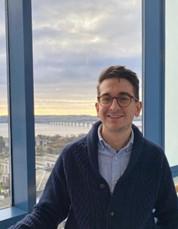
Tom Snelling (postdoc) and Anton Saalfrank (MSc student) in Philip Cohen’s lab have unveiled new insights into how mutations in the protein kinase ALPK1 cause two debilitating human diseases called ROSAH syndrome and Spiradenocarcinoma. The paper was published on December 7th 2023 in Proceedings of the National Academy of Sciences of the USA ( www.pnas.org/doi/10.1073/pnas.2313148120 DOI number 10.1073/pnas.2313148120).
ROSAH, an acronym for Retinal degeneration, Optic nerve oedema, Splenomegaly, Anhydrosis and migraine Headache is an autosomal dominant genetic disease caused by the mutation of threonine to methionine at position 237 in the ALPK1 protein. ROSAH syndrome was only discovered in 2019 but, since then, 66 patients from 29 unrelated families have been identified, all but one carrying the same threonine 237 to methionine mutation. Patients usually present in the clinic as young children with failing eyesight leading to blindness in early adulthood or with severe abdominal pain caused by a massively enlarged spleen. In contrast, Spiradenoma presents as a disfiguring growth usually on the head, neck or upper body, and can metastasise to a frequently fatal Spiradenocarcinoma. A study in 2019 found that about 45% of spiradenoma and 30% of spiradenocarcinoma samples contain the same mutation in ALPK1, changing valine to alanine at position 1092.
In 2018 it was established by Feng Shao’s lab in China that the normal form of ALPK1 is converted from an inactive to an active state when it binds to the bacterial metabolite ADP-heptose, which is not made by human cells. This triggers a signal transduction pathway in the cell that leads to the production of anti-bacterial substances, which fight the infection. Tom and Anton found that although the disease-causing mutant forms of ALPK1 are activated by bacterial ADP-heptose, they are also activated by several nucleotide sugars produced within human cells thereby leading to chronic activation of the pathway. These human metabolites appear to activate the disease-forming mutants of ALPK1 by binding to the N-terminal domain of ALPK1 at the same site as bacterial ADP-heptose.

In summary, ROSAH syndrome and Spiradenocarcinoma caused by ALPK1 mutation may be the first examples of diseases arising from the loss of specificity of a kinase for its allosteric activator. This unprecedented finding explains how the ADP-heptose signalling pathway of the immune system is activated abnormally in the absence of bacterial infection in these patients, leading to prolonged inflammation of particular cells and tissues that express high levels of ALPK1 and/or high levels of particular mammalian nucleotide sugars that activate the mutant ALPK1 enzymes, and hence lead to disease.
Tom Snelling said:- “This discovery not only represents a significant advance in our understanding of diseases caused by ALPK1 mutation but may also permit the development of drugs to treat ROSAH syndrome and Spiradenoma that selectively inhibit the mutant forms of ALPK1 that cause these diseases without affecting the normal form of ALPK1”

